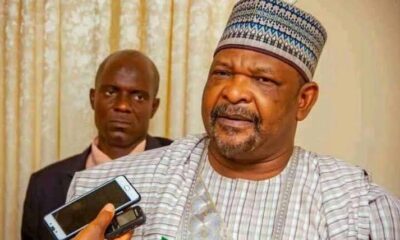FG Revised Up 2020 Budget to N10.81 Trillion Despite Revenue Shortfall
The National Assembly has finally approved the upwardly revised N10.81 trillion budget for 2020.
The revised budget was approved after Senator Barau Jibri-led Committee on Appropriation certified it okay.
The 2020 Appropriation budget was increased by N310 billion from the previously approved N10.5 trillion to N10.81 following the fall in oil revenue and the surge in health sector expenses as COVID-19 pandemic tear the world apart.
In the new revised budget statutory transfers was increased from N422 billion to N427 billion. While recurrent expenditure was raised from N4.928 trillion to N4.942 trillion.
The federal government also upped capital expenditure from the N2.230 trillion previously budgeted to N2.488 trillion.
Debt servicing was left unchanged at N2.951 trillion despite called for debt relief Africa’s finance ministers.
The Senate also includes N500 billion intervention fund for COVID-19, out of which N186 billion was budgted for the health sector.
Experts, however, doubt the Federal Government’s ability to fund such huge debt in a period when revenue generation is at record low and multilateral institutions are already stressed with loan applications from across the world.
Dr Sam Nzekwa, a former President, Association of National Accountants of Nigeria, said budget implementation is a subject of fund availability, saying he is not optimistic about the budget because even when the economy was regarded as buoyant, implementation was 50 percent and sometimes 40 percent.
He said, “Budget is subject to availability of funds and in most cases, we have not actually implemented the budget 100 per cent; you will see 40 or 50 per cent.
“Now that we have COVID-19, how do we now get money to do the budget; now we are talking of borrowing more.”
Another expert, Prof. Akpan Ekpo, a former Director-General, West African Institute for Financial and Economic Management, said the federal government should focus on upping the nation’s productivity and not procure loans to fund recurrent expenditure.
“I hope the borrowing will be used to finance infrastructure and not recurrent expenditure. There is a problem if it is used for recurrent expenditure.”
Ekpo advised the government to cut down on the cost of governance instead of reducing capital expenditure.
“My worry is that the amount earmarked for servicing debts is still very high,” he added.

 Forex3 weeks ago
Forex3 weeks ago


 Naira2 weeks ago
Naira2 weeks ago
 Billionaire Watch2 weeks ago
Billionaire Watch2 weeks ago




 Naira2 weeks ago
Naira2 weeks ago




 Naira4 weeks ago
Naira4 weeks ago




 Naira2 weeks ago
Naira2 weeks ago


 Naira1 week ago
Naira1 week ago
 Banking Sector4 weeks ago
Banking Sector4 weeks ago






















